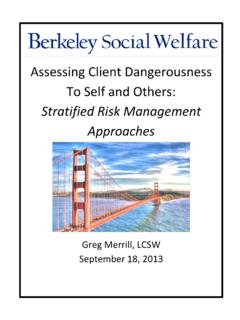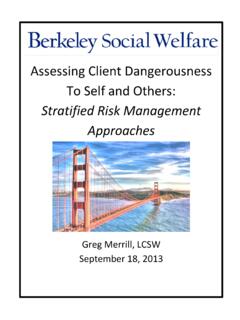Transcription of DANGEROUSNESS TO SELF AND OTHERS in Social Work …
1 University of California School of Social Welfare Field Preparation Panel DANGEROUSNESS . TO self AND OTHERS . in Social work Practice Presenter, Stan Taubman, PhD, LCSW. Contents Social work : A Multifaceted Profession .. 3. Licensed and Unlicensed Direct Practice Health Care Services and Social Services Psychotherapy and Non-Psychotherapy forms of Clinical Social work Informed Consent .. 5. The Legal Standard of Care .. 6. Ethics .. 8. Unprofessional Conduct per the LCSW License Law .. 9. Confidentiality and Privacy .. 13. Ethics .. 13. W&I Code (practice in public agencies) .. 16. COMIA (practice in private settings) .. 18. Psychotherapist-Patient Privilege .. 20. The Tarasoff Duty .. 27. Involuntary Holds: Welfare and Institutions Code Sec. 5150 .. 30. Grave Disability .. 32. Summary Chart of Legal and Ethical Duties Regarding Confidentiality and Danger .. 33. Suicide Risk .. 34. Assault Risk .. 39. Assessing Recidivism Risk.
2 42. Summary of Key Issues: Practical Considerations .. 47. DANGEROUSNESS to self and OTHERS Page 3. Social work . A MULTIFACETED PROFESSION. The Clinical Social work Scope of Practice CLINICAL Social work . From Section of the Business and Professions Code: The practice of clinical Social work is defined as a service in which a special knowledge of Social resources, human capabilities, and the part that unconscious motivation plays in determining behavior is directed at helping people to achieve more adequate, satisfying and productive Social adjustments. The application of Social work principles and methods includes but is not restricted to, counseling and using applied psychotherapy of a nonmedical nature with individuals, families and groups, providing information and referral services, providing or arranging for the provision of Social services, explaining and interpreting the psychosocial aspects in the situation of individuals, families or groups, helping communities to organize, to provide or improve Social and health services, and doing research related to Social work .
3 Psychotherapy, within the meaning of this chapter, is the use of psychosocial methods within a professional relationship, to assist the person or persons to achieve a better psychosocial adaptation, to acquire greater human realization of psychosocial potential and adaptation, to modify internal and external conditions which affect individuals, groups or communities in respect to behavior, emotions and thinking, in respect to their intrapersonal and intrapersonal processes. 2012 Stan Taubman, PhD, LCSW and the Berkeley Training Associates DANGEROUSNESS to self and OTHERS Page 4. ARE YOU PROVIDING PSYCHOTHERAPY? 1. Did you tell your client that the service you are providing is psychotherapy or therapy ? Did you tell your client that the service you are providing is not psychotherapy or not therapy ? 2. Do your agency's publicity materials say that the agency provides psychotherapy or therapy ? 3. Does your Job Description say that your role is to provide psychotherapy or therapy ?
4 4. If your agency bills an insurance plan on a fee for service basis, are your services billed to the plan as psychotherapy ? If your agency has a contract for grant funds, does the contract show that the funding source is paying for psychotherapy services? IF 5. Did you obtain your client's informed consent to provide psychotherapy ? Did you inform your client of the nature, risks, potential benefits and other implications of being a psychotherapy client? Did you inform your client about relevant HIPAA protections, psychotherapist-patient privilege, and Tarasoff requirements? Did you provide your client with a HIPAA compliant Notice of Privacy practices , if your are a covered entity ? 6. Are you documenting the standard elements of a health care clinical record? These (1) Chief complaint(s) / (presenting problem(s)). (2) Pertinent history and initial assessment findings (3) Findings from consultations and referrals to other health care providers (4) Validated Diagnosis (5) Treatment plan (6) Recommendations and interventions provided to the client, and client response (7) Progress in response to treatment (8) Assessment findings emerging during treatment (9) Prognosis (10) Discharge summary in closed cases 2012 Stan Taubman, PhD, LCSW and the Berkeley Training Associates DANGEROUSNESS to self and OTHERS Page 5.
5 INFORMED CONSENT. TO RECEIVE Social work SERVICES. Based on the value of client self -determination, the NASW Code of Ethics calls on Social workers to obtain informed consent prior to providing services to clients. The Code of Ethics specifies what the client needs to be informed about in order for their consent to be considered informed consent.. Informed Consent (a) Use clear and understandable language to inform clients the purpose of services risks related to the services limits to the services because of third party payor requirements relevant costs reasonable alternatives clients' right to refuse or withdraw consent and the time frame covered by the consent. Provide clients with the opportunity to ask questions. (b) If clients are not literate or have difficulty understanding the primary language used in the practice setting, provide a detailed verbal explanation or arrange for qualified translation services if possible.
6 When clients lack the capacity to provide informed consent, seek permission from an appropriate third party, informing the client consistent with their level of understanding. Take steps to enhance the client's ability to give informed consent. (d) When clients receive involuntary services, provide information about the nature and extent of services and about the extent of the client's right to refuse services. (e) If services are provided via electronic media ( computer, telephone), inform clients of the associated limitations and risks. (f) Obtain informed consent before audio taping, videotaping, or permitting observation of services to clients by third parties. Elsewhere in the Code of Ethics, Standard addresses Privacy and Confidentiality and states: (e) Discuss the nature and limitations of confidentiality with clients and interested OTHERS .. The limitations of confidentiality are among the risks related to the services as addressed in the Code section regarding Informed Consent.
7 2012 Stan Taubman, PhD, LCSW and the Berkeley Training Associates DANGEROUSNESS to self and OTHERS Page 6. THE LEGAL STANDARD OF CARE . The "standard of care" refers to a professional's legal duty to act "in a prudent and reasonable manner." Negligence has been defined by federal Courts as Failure to use care which a reasonable and prudent person would use under similar circumstances. Essentially this means that therapists and other professionals must adhere to a "community standard of practice" and follow the professional standards that are followed by OTHERS of the same profession with comparable qualifications in similar localities. Standard of Care for Health Care Professionals Section 501, California Civil Jury Instructions A [insert type of medical practitioner] is negligent if [he/she] fails to use the level of skill, knowledge, and care in diagnosis and treatment that other reasonably careful [insert type of medical practitioners] would use in the same or similar circumstances.
8 This level of skill, knowledge, and care is sometimes referred to as "the standard of care.". [You must determine the level of skill, knowledge, and care that other reasonably careful [insert type of medical practitioners] would use in the same or similar circumstances, based only on the testimony of the expert witnesses [including [name of defendant]] who have testified in this case.]. The "standard of care" is often referenced in malpractice suits when a client feels that he or she has suffered harm due to a therapist's negligent failure to adhere to the "standard of care." For a client suffers injuries in an automobile accident which occurred when driving while intoxicated and sues the therapist for failing to conduct an adequate substance abuse , sues the therapist for knowing that the client had a substance abuse issue but failed to treat it properly a client severely injures his back as the result of jumping off of a high place in a failed suicide attempt, and sues the therapist for failing to conduct an adequate suicide risk , sues the therapist for knowing that the client was suicidal but failed to manage the suicide risk properly 2012 Stan Taubman, PhD, LCSW and the Berkeley Training Associates DANGEROUSNESS to self and OTHERS Page 7.
9 The "standard of care" is an abstract concept. In a court of law the attorney for the plaintiff will generally bring in expert witnesses of the same profession and from the same locality as the defendant, establish that they are "prudent and reasonable" people, and examine them to establish what they would have done if they were the therapist in the case at issue. The defendant therapist will likely testify as to what actions were taken, and the clinical record will weigh heavily in supporting or discounting the therapist's claims. In some cases only the clinical record, and not the therapist's testimony, will be the basis for determining the quality of care that has been provided. 2012 Stan Taubman, PhD, LCSW and the Berkeley Training Associates DANGEROUSNESS to self and OTHERS Page 8. ETHICS. RELEVANT SECTIONS OF THE. NASW CODE OF ETHICS. (bolding added). 1. Social Workers' Ethical Responsibilities to Clients Commitment to Clients Social workers' primary responsibility is to promote the well-being of clients.
10 In general, clients' interests are primary. However, Social workers' responsibility to the larger society or specific legal obligations may on limited occasions supersede the loyalty owed clients, and clients should be so advised. self -Determination Social workers respect and promote the right of clients to self -determination and assist clients in their efforts to identify and clarify their goals. Social workers may limit clients' right to self -determination when, in the Social workers' professional judgment, clients' actions or potential actions pose a serious, foreseeable, and imminent risk to themselves or OTHERS . Competence (a) Social workers should provide services and represent themselves as competent only within the boundaries of their education, training, license, certification, consultation received, supervised experience, or other relevant professional experience. (b) Social workers should provide services in substantive areas or use intervention techniques or approaches that are new to them only after engaging in appropriate study, training, consultation, and supervision from people who are competent in those interventions or techniques.



